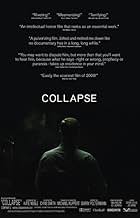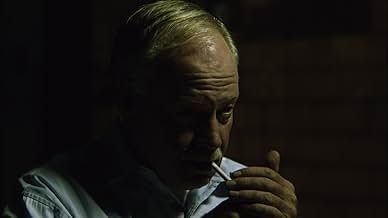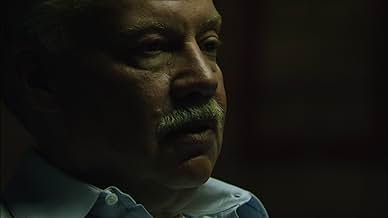A documentary on Michael Ruppert, a police officer turned independent reporter who predicted the current financial crisis in his self-published newsletter, From the Wilderness.A documentary on Michael Ruppert, a police officer turned independent reporter who predicted the current financial crisis in his self-published newsletter, From the Wilderness.A documentary on Michael Ruppert, a police officer turned independent reporter who predicted the current financial crisis in his self-published newsletter, From the Wilderness.
- Director
- Writer
- Star
- Director
- Writer
- All cast & crew
- Production, box office & more at IMDbPro
Storyline
Did you know
- TriviaAccording to director, Chris Smith, they initially agreed the primary subject was supposed to be the CIA's connections to drug smuggling within the Iran-Contra affair, specifically Ruppert's collaboration with Pulitzer Prize-winning reporter Gary Webb's mid-1990's investigative series, "Dark Alliance." But Ruppert didn't want to talk about the CIA. Instead, he wanted to talk about peak oil, and its critical implications for the future.
- Quotes
Michael Ruppert: It's kind of sad because we as a species have become so disconnected from the Earth. We don't have any real contact with the Earth. We don't have any sense of its functions, its feeling, its seasons, its timings.
- SoundtracksCollapse
Performed by Karli Larsen, Didier Leplae, Joe Wong
Ruppert hits us right away with peak oil, arguing that though actual supplies have been kept hidden by governments, even Saudi Arabia, which has more than anybody, is starting to run out, and we're clearly now on the down slope of the bell curve. He says no substitute will really work, because all the alternative energy sources require too much energy themselves to produce. The planet's infrastructure is going to shut down; it's just a matter of time. Parallel to this is economic collapse, and he predicted the present crisis -- but expected it a year or so earlier. (Mighn't he be jumping the gun a little on this larger collapse?)
Ruppert is a survivalist, warning us all to live locally. He compares the fates of North Korea vs. Cuba when they lost the Soviet oil lifeline: Korea, a monolithic dictatorship, took a terrible hit. So did Cuba, but people pulled together there, raised crops locally in every available spot of land, and soldiered through so well they're now eating better than ever. He would have us take the same route: raise our own food, and horde gold -- the actual metal, not paper certificates -- and organic seeds, which in a world stripped of supply will become currency.
Ruppert is a smoker, and Smith doesn't hesitate to show every time he lights up. This looks like a marathon, and the interview -- with challenging, skeptical questions off camera from the director from time to time, not that this overconfident autodidact type ever wavers -- is so intense Ruppert actually breaks down and weeps more than once at the hopelessness of it all.
Smith's film is effective, and if it leaves you in some doubt whether the man is a kook or a visionary maybe that's part of the sense of radical unease you may justifiably feel walking out of the theater. Though Ruppert is made to seem both knowing and deranged, his talk is smart and well-informed. Clearly fossil fuels are finite. It all depends on transportation; it all depends on electricity. Without oil, these shut down. If seven gallons of oil go into the making of every tire, how are we going to make a whole new set of cars that run on something else? What about plastics? What about overpopulation? Ethanol is a sick joke, clean coal a lie. Even wind and solar power won't be possible because we won't have the energy to set up the power sources to utilize them. Global warming is just the planet's way of crying "uncle." When oil runs out, we'd better be ready before the infrastructures all collapse, or it's going to be hard going. We've got to downsize. It won't be easy.
It's rare that anybody thinks things through this far. No wonder the tears come. They come when he thinks of Barack Obama, a smart, good, honest man, he says, but someone so locked into the systems that we can't look to him for help. And that's very, very sad. The world's last, best hope is an illusion. (These are just a few of Ruppert's points: into these 82 minutes he condenses the fruits of decades of independent thought and study.)
Smith asks Ruppert what spiritual beliefs sustain him and he simply quotes the Bible: "money is the root of all evil." He asserts that we must find ways to live without growth and profit as guiding motives. The pervasive pursuit of money is the great, tragic human flaw.
This is an intensified and distilled Michael Ruppert, very effective but a bit misleading: he has other facets. In another setting glimpsed in the film but available in full on YouTube you can see Ruppert in a suit and tie giving a rambling, self-indulgent slide lecture full of many of the same interesting facts he likes to cite, including the government's reliance on drug trading, but very different in feeling and veering (though he denies this elsewhere) into 9/11 Truth territory. Collapse ends with captions noting that Ruppert, whose only friend seems to be his faithful dog, is having trouble paying his rent and may be evicted from his Culver City place.
But again on YouTube you find him being interviewed recently in Oregon, where he has moved, looking and sounding sunny and grounded and socially connected. If he's a kook, he has lots of friends, some of them quite respectable, and "Peak Oil" is a rallying cry for many. The YouTube videos show Ruppert isn't always the intense nut case Smith gives us. He suffers, he thinks too much, but he can have fun; he can talk without a smoke. He feels Ashland is a place among many (including much of South America) where sustainability will be possible when the paradigm shift comes. The end of he world won't be the end of the world. This may not totally convince you, but it will scare you. Rupert protests in Smith's movie that he deals in conspiracy facts, not conspiracy theories. He just may be right.
- Chris Knipp
- Dec 14, 2009
- Permalink
- How long is Collapse?Powered by Alexa
Details
Box office
- Gross US & Canada
- $46,964
- Opening weekend US & Canada
- $7,800
- Nov 8, 2009
- Gross worldwide
- $46,964
- Runtime1 hour 22 minutes
- Color
Contribute to this page



















